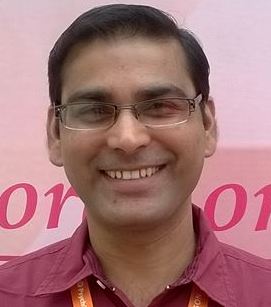
Dr. Sanjeev Kumar Gupta is a clinical psychologist dedicated to improving the lives of individuals with communication and neurodevelopmental disorders and their caregivers.
His expertise spans child and adolescent mental health, caregiver engagement, screen addiction, and cognitive behavior therapy for stuttering. His impact is vast, with over 15,000 cases evaluated, 25 research papers published, and 40 outreach programs attended. Dr. Gupta holds a Ph.D. in Clinical Psychology from the University of Mysore and an M.Phil. from the Central Institute of Psychiatry, Ranchi. The following is a Q&A where Dr. Gupta answers our questions.
Dr. Sanjeev Kumar Gupta Answers Our Questions
What was the driving force or motivation for starting the Handbook of Research on Child and Adolescent Psychology Practices and Interventions?
Dr. Gupta: Worldwide, it is estimated that one in seven, 10-19 year olds experience some kind of mental health issue. Children and adolescents facing mental health issues, disorders, and disabilities require early identification and intervention for independent living and a better quality of life. However, there is a pressing need for comprehensive resources that bring together the latest research, evidence-based practices, and multidisciplinary perspectives to address the diverse challenges in this field. Therefore, the author conceived the idea to work on a comprehensive book.
How does your professional background support your ability to be an authority on this book's coverage?
Dr. Gupta: My professional background as a senior consultant clinical psychologist, with extensive clinical and research experience in child and adolescent mental health, strongly supports my authority on the topics covered in this book. For over 14 years, I have gained comprehensive experience in practice, research, and clinical teaching, which has made me well-versed in the critical issues related to this field. This comprehensive experience allows me to effectively shape the book and provide valuable insights for readers.
What specific problems does the book address?
Dr. Gupta: This handbook aims to fill the gap in knowledge by presenting a wide range of topics, from childhood trauma to screen addiction in children and adolescents. The book also covers chapters on ethical and legal issues and challenges in disability certification, especially in children with specific learning disability and autism spectrum disorders. With contributions from leading experts, practitioners, and researchers, the book offers multidimensional insights and evidence-based strategies to empower mental health practitioners, academicians, researchers, and students.
How does the book provide a solution to these problems?
Dr. Gupta: The book covers a wide range of topics from prevention to intervention on various psychosocial issues such as child abuse, cyberbullying, internet addiction, etc., and focuses on certification and legal issues in children & adolescents with disabilities.
More Books on Metal Heath
How do you think publishing this book will impact this field of study?
Dr. Gupta: In its focus on recent trends and developments, this book makes a substantial contribution to the advancements of child and adolescent mental health practices and offers a valuable resource for practitioners, academicians, researchers, and students.
How diverse were the experts behind the research that went into this book?
Dr. Gupta: This book provides comprehensive coverage of child and adolescent mental health topics. It includes case studies, research-based findings, and thorough reviews on issues such as cyberbullying and screen addiction. The book brings together the expertise of 47 researchers, academicians, and mental health practitioners worldwide, ensuring diverse perspectives and a broad range of regional insights.
Have you been recognized for academic excellence or other related achievements in this field of study?
Dr. Gupta: I possess extensive experience in the areas covered by this book through my involvement in clinical practice, research, and professional affiliations. I have developed many educational brochures & videos for public education, published 26 research papers/book chapters, authored/edited 5 books, completed two research projects, and conducted 20 workshops and training programs.
About the Editor
 Dr. Sanjeev Kumar Gupta
Dr. Sanjeev Kumar Gupta is passionate about making a positive difference in the lives of parents/caregivers and persons with communication/neurodevelopmental disorders through clinical practice, public education, research, and teaching. His areas of interest are child and adolescent mental health, caregivers’ engagement; screen addiction in children and adolescents; cognitive behaviour therapy for stuttering, mindfulness meditation, and telerehabilitation. As part of his clinical duty, he has evaluated 15,000+ cases, issued 1,000+ certificates/reports, and attended 40+ outreach programs in various parts of India. He has developed educational brochures & videos for public education, published 26 research papers/book chapters, authored/edited 5 books, completed two research projects, and conducted 20 workshops and training programs. He has attended 100 academic conferences/meetings and presented 12 research papers in various conferences including the 31st International Congress of Psychology at Yokohama, Japan. He has received travel awards from the IBRO-APRC and DBT/Wellcome Trust India Alliance. He has reviewed many research papers for the journals like Journal of Learning Disability, Journal of Health and Allied Sciences NU, and Indian Journal of Clinical Psychology. On the teaching front, he has been an external examiner and question paper setter for M.Sc. and M.Phil. courses at different universities. He has delivered 22 lectures as an invited speaker and taken classes on various topics in Clinical Psychology for M.Sc. interns at All India Institute of Speech and Hearing (AIISH), Mysuru, India. He holds Ph.D. in Psychology from the University of Mysore, Mysuru, and M.Phil. in Medical & Social Psychology from the Central Institute of Psychiatry, Ranchi. He has also qualified UGC NET in Psychology.
Disclaimer: The opinions expressed in this article are the author’s own and do not reflect the views of IGI Global Scientific Publishing.